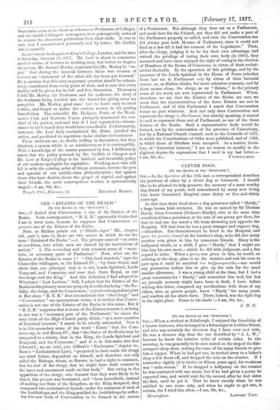THE "ESTATES OF THE REALM."
(ro THE EDITOR OF THE "SPECTATOR") denied that Convocation is one of the Estates of the Realm. Your correspondent, "11. E. B." apparently thinks that I am in error here, because be supposes that Convocation re- presents one of the Estates of the Realm.
Now, as Hallam points out (" Middle-Ages" III., chapter viii., part 3, note b), there are two senses in which we use the term "Estates of the Realm ":-1. The primary sense of "an order or condition, into which men are classed by the institutions of society." 2. The secondary and very common sense of "mem- bers, or necessary parts of Parliament." Now, what are the Estates of the Realm in sense 1? "This land standeth," says the Chancellor Stillington, in 7th Edward IV., "by three States, and above that, one principal, that is to wit, Lords Spiritual, Lords Temporal, and Commons, and over that, State Royal, as our Sovereign lord the King." And this definition I find adopted in Wharton's "Law Lexicon." Still, I admit that the Estates of the Realm in this primary sense are properly described as being " the No- bility, the clergy, and the Commoners," as your correspondent puts it. But since "R. E. B." does not maintain that " the Clergy " and " Convocation " are synonymous terms, it is evident that Convo- cation is not one of the Estates of the Realm in this sense. But if "R. E. B." supposes that it is one of the Estates in sense 2, as being in any way a "necessary part of the Parliament," he raises the very claim of the High-Church party, which, "as a mere question of historical interest," I assert to be utterly unfounded. Now it is in this secondary sense of the word " Estate " that the Com- mons say, in 2nd Henry IV., that "the States of the Realm may be compared to a trinity, that is, the King, the Lords Spiritual and Temporal, and the Commons ;" and it is in this sense also that Edward I., we are told, (see Gilbert's "Exchequer," chapter iv., Burn's "Ecclesiastical Law), "projected to have made the clergy one third Estate, dependent on himself, and therefore not only called the Bishops, whom, as Barons, he had a right to summon, but the rest of the clergy, that he might have their consent to the taxes and assessment made on that body." But owing to the opposition of the clergy, who foresaw that they were likely to be taxed, this project was frustrated, and "from henceforth, instead of making one State of the Kingdom, as the King designed, they composed two ecclesiastical Synods, under the summons of each of the Archbishops, and the King gratified the Archbishops by suffer- ing this new body of Convocation to be formed in the nature of a Parliament. But although they thus sat as a Parliament, and made laws for the Church, yet they did not make a part of the Parliament properly so called, and even the Convocation-tax did always pass both Houses of Parliament, since it could not bind as a law till it had the consent of the Legislature." Then, after the clergy, judging it to be for their own advantage, had waived the privilege of taxing their own body (in 1664), they assumed and have since enjoyed the right of voting in the election of Members of the House of Commons, in virtue of their ecclesi- astical freeholds. By the operation of this privilege, and by the presence of the Lords Spiritual in the House of Peers (whether these last sat in Parliament only by virtue of their baronial tenure, or, as Hallam thinks, for more extensive reasons), and by these means alone, the clergy, as an "Estate," in the primary sense of the word, are now represented in Parliament. When, therefore, we say that the Estates of the Realm are met, we mean that the representatives of the three Estates are met in Parliament, and of this Parliament I assert that Convocation forms no part whatever. And not only does Convocation not represent the clergy in Parliament, but strictly speaking, it cannot be said to represent them out of Parliament, as one of the three Estates of the Realm. Such a representative body would be formed, not by the convocation of the province of Canterbury, but by a National Church Council, such as the Councils of 1237, in which the Constitutions of Otho were published, and of 1268, in which those of Ottobon were accepted. As a matter, there- fore, of "historical interest," I see no reason to modify in the slightest degree the expressions that I used in my last letter.—


































 Previous page
Previous page